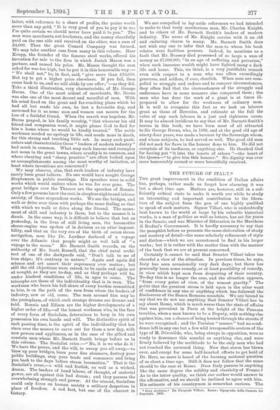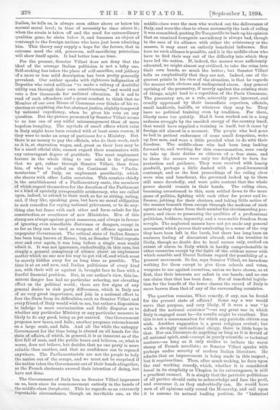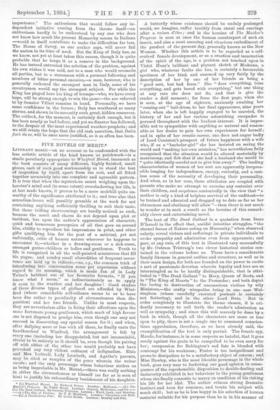THE FUTURE OF ITALY.* THE great improvement in the condition
of Italian affairs has, perhaps, rather made us forget how alarming it was but a short time ago. Matters are, however, still in a suf- ficiently critical state to make it worth our while to study an interesting and important contribution to the litera- ture of the subject from the pen of one highly qualified to speak of such matters. Signor Villari, who is undoubtedly best known to the world at large by his valuable historical works, is a man of politics as well as letters, has sat for years in the Senate, and was Minister of Education in the Marchese di Rudini's Government. It is hardly necessary to say that the pamphlet before us presents the same elaboration of study and mastery of detail—the same scholarly refinement of style and diction—which we are accustomed to find in his larger works ; but it is rather with the matter than with the manner of the book that we are at present concerned.
Certainly it cannot be said that Senator Villari takes too cheerful a view of the situation. In previous times, he says, Italy has seen occasionally very dark days; but there has generally been some remedy, or at least possibility of remedy, in view which kept men from despairing of their country. To-day this is no longer the case, and the situation appears, from every point of view, of the utmost gravity." The point that the greatest stress is laid upon is the utter want of confidence in any one or anything which has followed the disclosures of the Bence Romano, scandals. We are bound to say that we do not see anything that Senator Villari has to say about Rome, which is much worse than the state of affairs that was prevalent in Paris at the height of the Panama troubles, when a man known to be a Deputy, with nothing else against him, ran a chance of being hooted through the streets if he were recognised ; and the Parisian " masses" had no confi- dence left in any one but a few wild irresponsible orators of the type of M.D6roulede, who, being always in opposition, were as ready to denounce this scandal as anything else, and were firmly believed by the multitude to be the only men who had not touched the accursed thing. Now that storm has blown over, and except for some half-hearted efforts to get hold of Dr. Herz, no more is beard of the burning national question of so short a time ago. Still it does not follow that the same should be the case at Rome. Does Italy possess in anything like the same degree the solidity and elasticity of France ? As to the latter quality, we think our author would answer in the affirmative, and we should be inclined to agree with him. His estimate of his countrymen is somewhat curious. The Dove Andiamo1 Da pasqoalo Yillari. Roma: Tlpogralla della Clement del Depatati. 1898. Italian, he tells us, is always seen either above or below his normal moral level; in time of necessity he rises above it ; when the strain is taken off and the need for extraordinary qualities gone, he sinks below it, and becomes an object of contempt to the foreign nations who have just been admiring him. This theory may supply a hope for the future, that in extreme need the old, generous, self-sacrificing patriotism will show itself again. It had better lose no time.
For the present, Senator Villari does not deny that the ideal of the average Italian politician is not a lofty one. Self-seeking has taken the place of self-sacrifice, and jobbery of a more or less mild description has been pretty generally prevalent. Our author speaks with righteous indignation of Deputies who voted millions "to make a railway of doubtful utility run through their own constituencies," and would not vote a few thousands for national education. It is sad to read of such offenders, and a great comfort to think that no Member of our own House of Commons ever thinks of his re- election or anything else but abstract justice, slightly tempered by national expediency, when he gives his vote on any question. But the picture presented by Senator Villari seems to us less one of any wilful mismanagement than of mere hopeless bungling. The myriads of small offices which exist in Italy might have been created with at least some reason, if they were to make an army of partisans for a Ministry. But there is no money to pay the officials, who do their work, such as it is, at starvation wages, and, great as their love may be for a small official title, cannot regard their nominators with any extravagant degree of gratitude. The most unpleasant feature in the whole thing to our mind is the glimpse that we get, rather through Senator Villari, than from him, of what is called on the Continent the " Parlia- rnentarism " of Italy, an unpleasant peculiarity, which she shares with other Latin countries. This consists chiefly in the establishment of a Parliamentary caste, the members of which regard themselves for the duration of the Parliament as a kind of specially irresponsible aristocracy, who are called upon, indeed, to attend to their work as far as sitting, voting, and, if they like, speaking goes, but have no moral obligation to seek remedies for crying national grievances, or to do any- thing else but fence with each other and form cabals for the construction or overthrow of new Ministries. Men of this stamp are always against great measures, and always in favour of ignoring even remediable distresses or dangers, except in so far as they can be used as weapons of offence against an unpopular Government. The critical state of Italian finance has been long known at Rome ; but, as Senator Villari repeats over and over again, it was long before a single man would admit it. It was not ignorance, undoubtedly, in this case, but simply a general conspiracy of silence about an unpleasant matter which no one saw his way to get rid of, and which must be merely hidden away for as long time as possible. The time is at an end now, and Italian politicians of every kind are, with their will or against it, brought face to face with a fearful financial problem. Bat, in our author's view, this im- minent danger has had no particular sobering, nor elevating effect on the political world ; there are few signs of any general desire to sink party differences, which in Italy are of no very great importance, and join in a national effort to free the State from its difficulties, such as Senator Villari and every friend of Italy would wish to see, but rather a disposition to indulge in mere recrimination and futile disputes as to whether any particular Ministry or any particular measure is likely to do any good, being as yet untried. One Government proposes new taxes, and falls ; another proposes retrenchment on a large scale, and falls. And all the while the unhappy Government for the time being is abused on all hands for the state of affairs, of which, in general, it is as innocent as of the first fall of man, and the public hears and believes, or, what is worse, does not believe, but decides that no one party is more reliable than another, and that no confidence can be reposed anywhere. The Parliamentarists are not the people to help the nation out of the scrape, and we must not be surprised if the nation takes the Government out of their hands altogether, as the French electorate avowed their intention of doing, but have not done.
The Government of Italy has, as Senator Villari impresses on us, been since its commencement entirely in the hands of the middle-class (borghesia). This he regards as an extremely regrettable circumstance, though an inevitable one, as the middle-class were the men who worked out the deliverance of Italy, and were the class to whom necessarily the task of ruling it was committed, quoting De Tocqueville to back up his opinion that an unmixed bourgeois ascendency is always bad, though in the case of its alliance with either the aristocracy or the masses, it may exert an entirely beneficial influence. But here no such alliance is possible, and it is the middle-class who have to find their way out of the difficulty into which they have led the nation. If, indeed, the masses were sufficiently educated, we might almost say civilised, to take the reins into their own hands, so much the better; but Senator Villari tells us emphatically that they are not. Indeed, one of the gravest points in his view of the situation, is that he regards the masses with obvious and undisguised alarm. Any general uprising of the peasantry, if merely against the existing state of things, might lead to a repetition of the Paris Commune. The peasantry are, as a rule, miserably poor, ignorant, and cruelly oppressed by their immediate superiors, officials, small landlords, bailiffs, or whatever they may be. They have no political training even by tradition. For them, liberty came too quickly. Had it been worked out in a long arduous struggle by the unaided energy of the country itself, that would have supplied a training in itself, but it came by foreign aid almost in a moment. The people who had gone to bed in patient endurance of some small despotism, woke up free men, and were a little puzzled what to do with their freedom. The middle-class who had been long looking forward to, and working for this consummation, were ready to take up their duties as citizens of a free state, and to them the masses were only too delighted to turn for protection and guidance. They were received with hearty goodwill, perhaps a little dashed with a good-humoured contempt, and as the first proceedings of the ruling class were wise and beneficent, the governed looked up to them still more devotedly, and were quite content that the whole power should remain in their hands. The ruling class, becoming accustomed to this, soon settled down to the mere game of politics, fighting with each other for power and in- fluence, jobbing for their electors, and taking little notice of the masses beneath them except through the medium of such agents as they chose from their number for electioneering pur- poses, and chose as possessing the qualities of a professional politician, boldness, ingenuity, and a reasonable freedom from scruple. The neglected masses have not yet made any general movement which proves their awakening to a sense of the way they have been left in the lurch, but there has long been an ominous feeling of discontent abroad, and the troubles in Sicily, though no doubt due to local causes only, excited an extent of alarm in Italy which is hardly comprehensible in other countries except by the light of the evident terror with which sensible and liberal Italians regard the possibility of a peasant movement. So far, says Senator Villari, we have done nothing for them except to give them schools and votes, weapons to use against ourselves, unless we have shown, as at first, that their interests are safest in our hands; and no one can claim that that has been done. For of beneficial legisla- tion for the benefit of the lower classes the record of Italy is more barren than that of any of the surrounding countries.
The question remains, What remedy, if any, can be found for the present state of affairs Some say a war would serve that purpose, and very likely, if it were a war " to defend the national existence "—as any great war in which Italy is engaged must be—its results might be excellent. But this is not a consummation for which any patriotic citizen can wish. Another suggestion is a great religious revival ; but with a strongly anti-national clergy, there is little hope in that. Nor can literature do anything as long as it is devoid of all national spirit, and—except in purely scientific or technical matters—as long as it only studies to imitate the worst stamp of French novelists ; so Senator Villari speaks with perhaps undue severity of modern Italian literature. He admits that an improvement is being made in this respect but it requires time. Then, after much seeking, he fixes upon the real working remedy, which, whether it is considered banal in its simplicity or Utopian in its extravagance, is still a practical counsel. It is simply that the patriotic politicians of all parties should unite to acknowledge and face the peril, and overcome it, as they undoubtedly can. He would have men of all opinions rally round the Monarchy, and call upon it to assume its natural leading position, its " historical importance." The enthusiasm that would follow any in- dependent initiative coming from the throne itself—an enthusiasm hardly to be understood by any one who does not know how much the present Monarchy means to Italians —would in itself contribute to make the difficulties far less. The House of Savoy, as our author says, will never fail the nation in its time of need. Bat the King of Italy has, as we know, not yet at least taken this course, though it is quite probable that he keeps it as a reserve in the background. He has instead entrusted the solution of the problem, against his own wishes it was said, not to a man who would reconcile all parties, but to a statesman with a personal following and numbers of bitter personal enemies,—a man, however, who is generally reckoned the strongest man in Italy, some of his countrymen would say the strongest subject. For while the King has played here his king of trumps—who, we have every hope, will be strong enough to win the game—the ace referred to by Senator Villari remains in hand. Personally, we have some confidence in the future ; Italy has weathered so many storms, and shown in its necessity such great, hidden resources. The outlook, for the moment, is certainly dark enough, but it has been nearly as bad before, and yet no disaster has followed, to the despair of the most experienced weather-prophets; and we still retain the hope that the old rash assertion, that Italia far& da se, will be once more justified, as it so often has been.




































 Previous page
Previous page